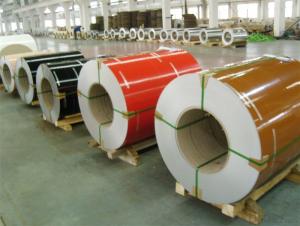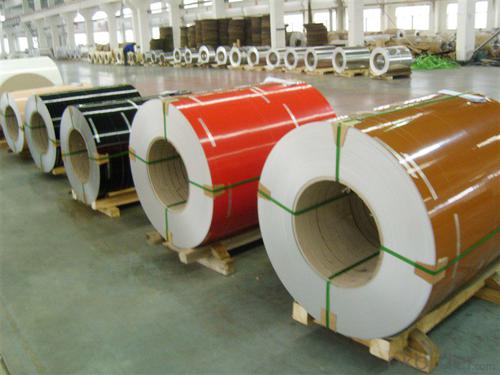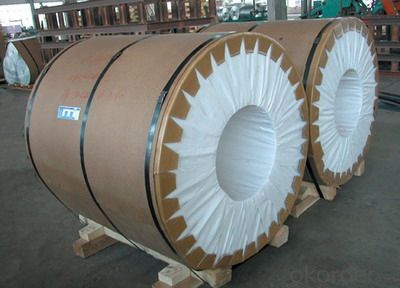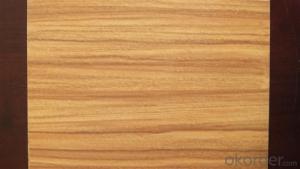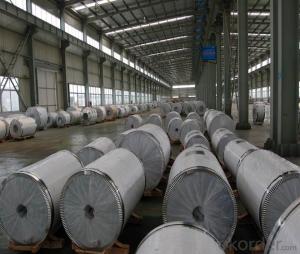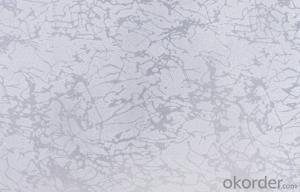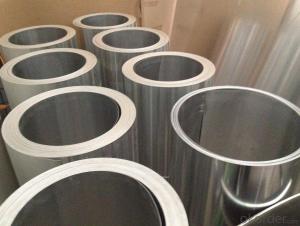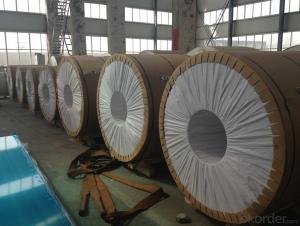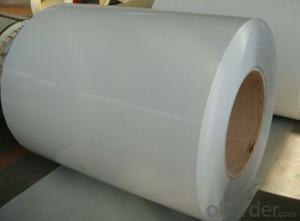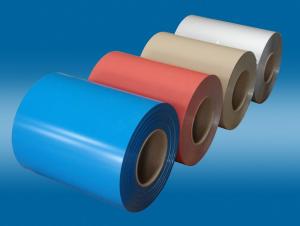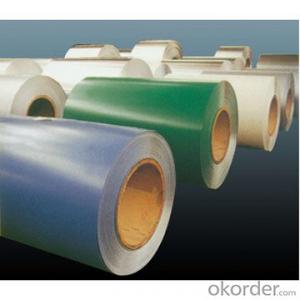Gpc1430h41 Prepainted Aluminum Coils for Construction
- Loading Port:
- Shanghai
- Payment Terms:
- TT OR LC
- Min Order Qty:
- 5 m.t.
- Supply Capability:
- 10000 m.t./month
OKorder Service Pledge
OKorder Financial Service
You Might Also Like
Specification
1.Structure of AA1060 Prepainted Aluminium Coils Used for Construction Description
AA1060 Prepainted Aluminium Coils Used for Construction are of a wide range of colors, which give wonderful appearance no matter in residential and commercial constructions or great exhibition centers.
AA1060 Prepainted Aluminium Coils Used for Construction have been widely used in the fields of construction and decoration, electronic applications, lighting decoration, air-condition air pipes, sandwich panels and drainages etc.
2.Main Features of AA1060 Prepainted Aluminium Coils Used for Construction
• Superior quality of raw material
• Reasonable and stable chemical composition
• Accurate tolerance
• Goode mechanical property
3.AA1060 Prepainted Aluminium Coils Used for Construction Images
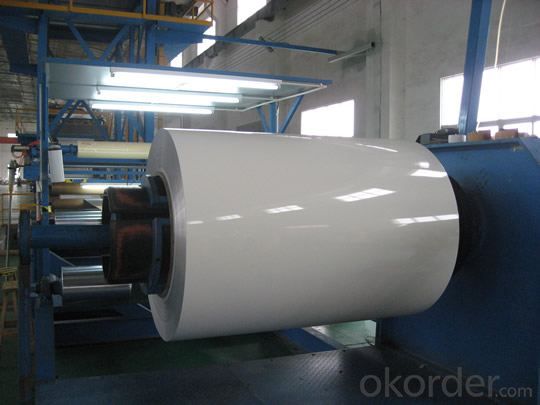
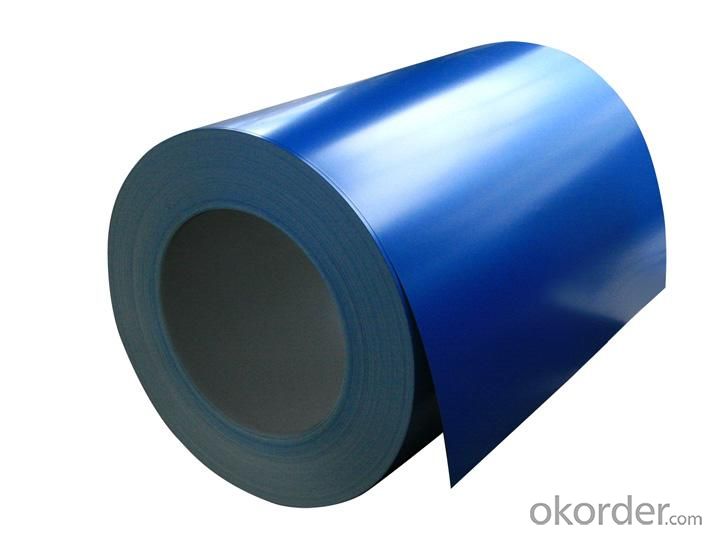
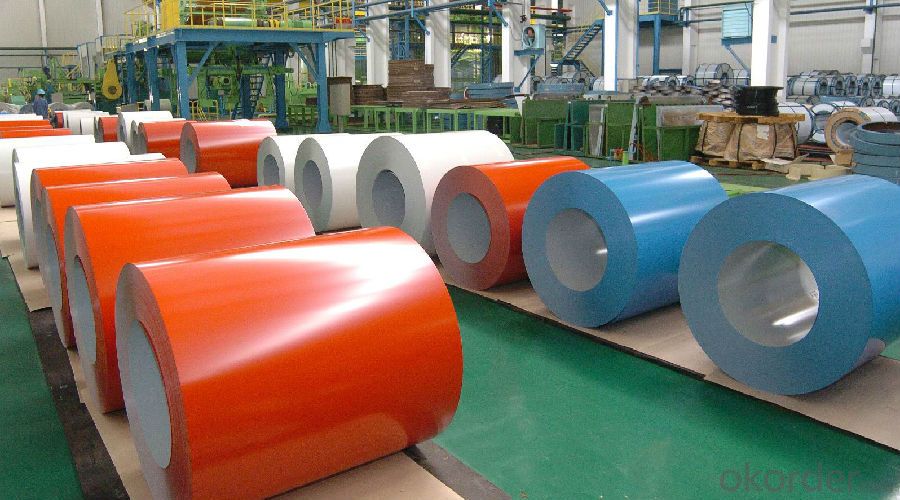
4.AA1060 Prepainted Aluminium Coils Used for Construction Specification
Alloy | AA1060 |
Temper | H14,H16,H18,H22,H24,H26,H32,O/F |
Thickness | 0.03mm-3.0mm |
Width | 30mm-1700mm |
Coating | PE,PVDF,Epoxy |
Painting Thickness | Standard 16-25 Mic, max 40 Mic |
Color | According to RAL colors or customers' samples |
Standard | GB/T 17748-1999 |
5.FAQ:
What is the quality standard?
---Usually our standard is GB3880-2006
What is the largest width?
---It is 2000mm
What is the MOQ?
---Usually we can accept 80 tons.
- Q: How do aluminum coils contribute to sustainable transportation?
- Aluminum coils contribute to sustainable transportation by offering lightweight and corrosion-resistant properties, making them ideal for manufacturing various components in vehicles. By using aluminum coils, vehicles can be made lighter, resulting in improved fuel efficiency and reduced emissions. Additionally, the recyclability of aluminum ensures that it can be reused, reducing the need for virgin materials and minimizing environmental impact.
- Q: Can aluminum coils be customized?
- Yes, aluminum coils can be customized according to specific requirements. Aluminum coils are highly versatile and can be customized in terms of thickness, width, length, alloy composition, surface finish, and other specifications. This allows for a wide range of applications in various industries such as construction, automotive, aerospace, electronics, and packaging. Customization of aluminum coils can be done through processes like slitting, cutting-to-length, embossing, painting, and coating. This flexibility in customization enables manufacturers to meet the unique needs of their customers and ensures that the aluminum coils are optimized for their intended use.
- Q: Is there any specific regulation or standard that dictates the weight of an aluminum coil?
- <p>Yes, there are regulations and standards that dictate the weight of aluminum coils. These are often set by industry standards such as ASTM (American Society for Testing and Materials) and EN (European Norm). The weight of an aluminum coil can vary depending on its thickness, width, and length, and manufacturers must adhere to these standards to ensure consistency and quality. For example, ASTM B 209 specifies the standard for aluminum and aluminum alloy sheet and plate, which includes weight limits. Compliance with these standards is crucial for the safety and performance of products that utilize aluminum coils.</p>
- Q: What are the standard tolerance levels for aluminum coils?
- Depending on the industry and application, the tolerance levels for aluminum coils can differ from the standard. Generally, these tolerance levels are established by industry standards and specifications like ASTM or ISO. For thickness, the tolerance levels for aluminum coils can range from +/- 0.002 inches to +/- 0.020 inches, depending on the aluminum's specific grade and thickness. Similarly, the tolerance levels for width can vary from +/- 0.010 inches to +/- 0.250 inches. Regarding flatness, the standard tolerance levels for aluminum coils specify the maximum deviation from a flat plane. This can range from 0.001 inches to 0.020 inches, depending on the application's specific requirements. Other factors that can affect tolerance levels include the aluminum coils' surface finish, edge condition, and mechanical properties. To determine the appropriate tolerance levels for aluminum coils, it is important to consult relevant industry standards, specifications, and the specific requirements of the application.
- Q: What is the weight of aluminum coils?
- The weight of aluminum coils can vary depending on the specific dimensions and thickness of the coils. However, on average, aluminum coils can range in weight from a few hundred pounds to several thousand pounds. It is important to note that the weight of aluminum coils can also be influenced by factors such as the alloy composition and any additional coatings or treatments applied to the coils.
- Q: What are the potential applications of coil-laminated aluminum coils?
- Coil-laminated aluminum coils have a wide range of potential applications in various industries. They can be used in the manufacturing of automotive parts, such as body panels and interior components, due to their lightweight yet durable nature. Additionally, they are suitable for building and construction purposes, including roofing, siding, and insulation, as they offer excellent corrosion resistance and thermal conductivity. Furthermore, coil-laminated aluminum coils find use in electrical industries for producing transformers, capacitors, and other electrical components due to their excellent electrical conductivity. Overall, their versatility and desirable properties make coil-laminated aluminum coils valuable in numerous applications across different sectors.
- Q: Can aluminum coils be used in chemical processing plants?
- Indeed, chemical processing plants can utilize aluminum coils. Aluminum, a versatile and extensively employed substance across multiple industries, including chemical processing, boasts exceptional resistance to corrosion. Consequently, it proves apt for the manipulation and conveyance of diverse chemicals. The application of aluminum coils extends to heat exchangers, condensers, evaporators, and other chemical processing equipment. Moreover, aluminum coils boast a lightweight nature and exhibit high thermal conductivity, promoting efficient heat transfer and energy conservation. Nevertheless, it remains crucial to carefully evaluate the specific demands and compatibility of the chemicals being processed to ascertain the suitability of aluminum coils for the intended use.
- Q: How are aluminum coils inspected for quality control?
- To maintain quality control, aluminum coils undergo a thorough examination employing visual inspections and various non-destructive testing methods. These measures guarantee that the coils conform to the necessary specifications and are devoid of any flaws or defects. In order to identify surface defects, including scratches, dents, and irregularities in shape or size, trained personnel meticulously scrutinize the coils. Additionally, inspectors check for signs of contamination, oxidation, or discoloration. If any abnormalities are detected during this visual inspection, they are promptly noted and addressed. Apart from visual inspections, internal quality evaluation of the aluminum coils is conducted through non-destructive testing techniques. One commonly employed method is ultrasonic testing, which involves transmitting high-frequency sound waves through the coils. The reflected sound waves are then analyzed to detect internal defects such as voids, cracks, or delaminations. This technique allows for a comprehensive assessment of the coil's integrity without causing any harm to the material. Another non-destructive testing method used for quality control is eddy current testing. This technique induces electrical currents in the coils and measures the resulting magnetic fields. Any variations in the magnetic fields can indicate flaws or defects in the aluminum, such as cracks or inclusions. Eddy current testing is particularly effective in identifying surface defects and discontinuities. Furthermore, measurements of crucial physical properties such as thickness, width, and flatness are taken to ensure compliance with the required standards. Specialized instruments like micrometers, calipers, or laser scanners are typically employed for this purpose. In conclusion, the inspection process for aluminum coils encompasses a combination of visual inspections and non-destructive testing methods. This comprehensive approach guarantees that the coils are fault-free, meet the necessary specifications, and exhibit superior quality.
- Q: Are aluminum coils available in custom sizes?
- Yes, aluminum coils are available in custom sizes. Aluminum coils are versatile and can be manufactured to meet specific size requirements. This flexibility allows for a wide range of applications across various industries. Whether it's for HVAC systems, transportation, construction, or other purposes, aluminum coils can be custom-made to fit the specific needs of a project. Custom-sized aluminum coils ensure a perfect fit and optimal performance, offering greater efficiency and cost-effectiveness.
- Q: How are aluminum coils used in the production of gutters and downspouts?
- Aluminum coils are used in the production of gutters and downspouts by being formed and shaped into the desired gutter or downspout profile. The coils are typically fed through a roll-forming machine that bends and molds the aluminum into the specific shape and size required. This process allows for the production of seamless gutters and downspouts, providing a more efficient and aesthetically pleasing solution for drainage systems.
Send your message to us
Gpc1430h41 Prepainted Aluminum Coils for Construction
- Loading Port:
- Shanghai
- Payment Terms:
- TT OR LC
- Min Order Qty:
- 5 m.t.
- Supply Capability:
- 10000 m.t./month
OKorder Service Pledge
OKorder Financial Service
Similar products
Hot products
Hot Searches
Related keywords
